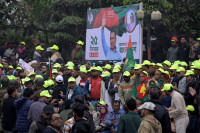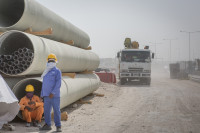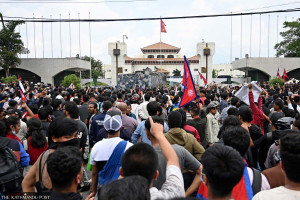Opinion
Looking for options
For Nepal to become energy efficient it has to diversify its trade with other countries
Jagannath Adhikari
The intertwined problems of a contested politics in the Tarai and the economic blockade by India has led to an epiphany that Nepal is severely energy insecure. And that the availability of petroleum is critical to our daily survival. We are yet to see whether this realisation will result in any sustained efforts to make the country energy secure. Furthermore, there are equal chances that the present energy crisis could put the economic and political development of the country at some risk. Now it all depends on the actions that our political leaders and the government take over the coming two years to find sustainable alternative energy sources, diversify trade, conduct diplomacy with our neighbouring countries and solve the political problem in the Tarai.
Prevailing problems
Having energy security does not always mean producing sufficient energy within the country, even though that would be ideal. Many countries have become energy secure by guaranteeing the availability of energy through different sources. Therefore, energy security also means managing the overall sources of supply from internal and external sources. As Nepal depends more and more on exogenous sources of energy, that is, energy not produced within households or on the farms as in the past, for household needs and transportation, guaranteeing a regular supply of energy has become a life and death issue. This is why the current blockade feels more suffocating than the one in 1989-90.
Given the current dilemma that Nepal is facing, there is a need to deal on two fronts in order to become energy secure. This can be aptly expressed by resorting to Albert Einstein’s famous equation, ‘E=MC2’ where E is energy security, M is the Madhes (the degree of the settlement of the political problem here) and C is China (the degree of taking advantage of its progress and getting support). There is more to gain by using ‘C’, but we cannot overlook ‘M’. The basic assumption in this equation is that taking care of M will resolve the standoff with India.
Addressing the issue
The problem in the Tarai demands the immediate attention of the government. As revealed in the media and through speeches given by political leaders, the government is close to fulfilling the demands of the dissenting political parties except for the demarcation of the states. It is a well-known fact that these problems cannot be solved without revising the constitution which requires the support of the major political parties. It would have been much easier to revise the constitution if there was a grand
coalition government such as during the time of writing the constitution. In fact, Nepal needed such a coalition government for some more time to carry out the reconstruction works in the earthquake-affected areas and effectively implement the constitution, which also means making the required amendments. Somehow, this did not happen. Whatever the case, what is required is constant dialogue among the political parties in the government, other political parties and dissenting parties to find an agreeable solution.
Civil society members and public intellectuals could play an important role in connecting the concerned parties in the dispute and narrowing down the gap between them through constant dialogue. They are also the appropriate persons to solicit views, and understand the interests, of various groups of people living in different locations in the Tarai with regard to the demarcation of the states. This is especially important if a solution acceptable to a large majority of the people living in Tarai is to be found. This political exercise should somewhat ease India’s restrictions on the flow of fuel and other commodities across its border with Nepal. No matter whether Nepal likes it or not, it needs to depend on India for at least oil and other commodities even in case Nepal finds alternative sources. Otherwise, Nepal will certainly succumb to a predicament of over-dependence on a single country as it is happening now.
Trade diversification
China has been quietly revolutionising its sources of energy, and it is rapidly moving towards renewable energy at an unprecedented rate. The country has become a major global player in the development of solar and wind energy. It now has 35 GW of installed solar power and 135 GW of wind energy, which were mainly developed within the last two-three years. In just one year in 2013, China developed 12 GW of solar energy. Therefore, it will not be difficult for it to help Nepal develop one GW of solar power and one GW of wind energy. For Nepal, that is a lot of energy and it will be sufficient for household needs (cooking and lighting) and public transportation in Kathmandu and other urban areas. Moreover, the transfer of technology could be very advantageous for Nepal. Therefore, Nepali leaders should show commitment and request China in unison to help Nepal develop these energy sources within the country.
China has also been expanding its infrastructure like roads and railways in Tibet, reducing the restrictions that geography imposes on it. Extending China’s road network and the railroad to the border trade points with Nepal could revolutionise the Nepali economy and help diversify its sources of fuel and trade. After these developments in the internal sources of energy and infrastructure linking China are in place, Nepal will have the opportunity to convert the curse of geography, that is, its landlockedness, into a vibrant trade zone between the two economically giant countries in Asia.
It would be ideal if each state to be carved in Nepal could become a trade corridor between China and India with provisions of social and political inclusion so that the desired political structure could also be developed at the same time. However, all this requires a political commitment for long-term development so that these goals or visions are not diluted by short-term interests to gain political power. In fact, these visions are what the political leadership proclaim to achieve from time to time, but they lose sight of them when they vie for political power.
Adhikari is a social scientist




 12.12°C Kathmandu
12.12°C Kathmandu










%20(1).jpg&w=300&height=200)

